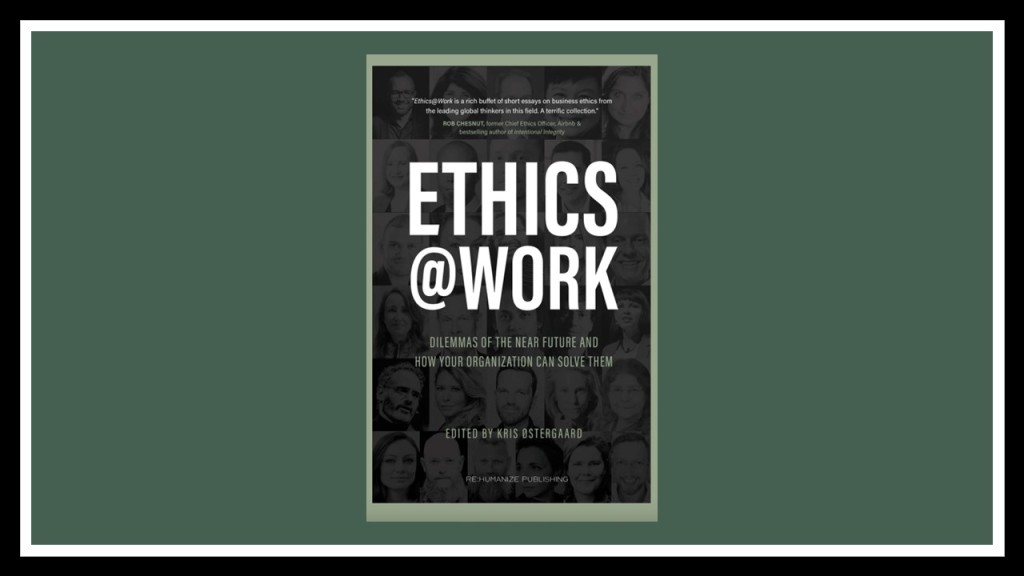
Ethics@Work, Kris Østergaard, ed. Re:humanize Publishing (ISBN: 9788797284100), 2022.
Summary: An anthology of essays on workplace ethics in the context of near future challenges, focusing on the systemic context, the inner life of an organization, and the humans at the core of every enterprise.
We are operating in a rapidly changing world with environmental challenges, the digital integration of all of our lives, and the digital extension of human capabilities. What this means for companies as they operate in this changing environment, how this affects the internal life of a company, and how technological advance will shape our understanding of what it means to be human, and even how this impinges on human agency and selfhood are vital questions. They are ethical questions. As Google once framed it, “don’t be evil.” But what does that look like?
This anthology by business and technology leaders connected with Denmark’s Re:humanize Institute believe ethical business behavior will not simply be advantageous but essential. The authors explore a range of topics from the environment to peacemaking to data transparency. They consider the uses of AI, and human-machine convergence, including neural rights. I can’t touch on every essay but I will highlight some I found thought-provoking.
The anthology is organized into three parts. The first is systemic, where workplace ethics are set in the context of the global marketplace. Adam Pantanowitz opens with an essay dividing our lives into natural, conceptual, and digital layers. He outlines the challenges as our neural/conceptual context may merge with digital technologies in way that directly impinge on other minds as well as the natural world. David Bray addresses the explosion of data and our capabilities to use it and advances an OARS framework (Obligations, Acknowledged biases, Responses to Obligations, and Safeguards related to potential biases) to address ethical use of our databases. Nell Watson argues that organizations must stop deferring environmental costs to future generations. Brian David Johnson argues that the need is not to develop ethical AI but to make AI compliant with the ethical culture of an organization (I think it may be argued that AIs, for better or worse will, through the implicit biases built into algorithms, reflect the actual ethics of an organization).
Part Two goes inside the organization, into the machine room as it were. Tiffany Vora draws three principles from biomedical ethics and considers their bearing on business: Justice, Doing Good, and Respect. Again, the management of data-driven solutions arises and governance, accountability, transparency, and explainability are discussed with a valuable list of questions to consider. Guendalina Donde’ outlines a similar set of human values to drive technology application and Ray Eitel-Porter offers a list of seven principles with AI: soundness, fairness, accountability, transparency, explainability, privacy, and sustainability. A fascinating essay explores the tension between “backdoor” access to encryption and the inevitable weakening of privacy with any such move., and the looming danger of quantum computing to all encryption. Arash Aazami describes his effort to build a company that profited by selling less energy. A couple essays featured activist companies like Patagonia and Ben and Jerry’s.
Finally, part three looks at the humans at the center of the emerging business environment. Divvya Chander’s opening essay on neural sovereignty and human rights raised questions I never thought about because, until now the capability didn’t exist. Emerging technologies allow us to read one’s brain activity and to write to the brain. What happens when the ability to read my mind, or to change my mind exists? If brainprints are used as IDs, could this be used, perhaps along with genetic data, to create a truly scary deepfake of any of us? What happens when my thinking can be surveilled? Roger Courage Matthisen offers practical principles for embodying anti-racist leadership. I thought the top suggestion was “showcase your mistakes,” creating a learning environment that allowed space for mistakes. Nathaniel Calhoun acknowledges that “business ethics” is often an oxymoron and describes the practices he coached Silicon Valley startups to use to make ethics endemic to those companies, where individuals were celebrated for raising ethical concerns.
This is a fascinating collection, exploring questions most of us are just starting to think about. At the same time, it seems to assume that we know what is ethical and why one ought live ethically rather than expediently. The authors seem to assume that we bring an ethical conscience to work that needs to be honed by consideration of particular ethical challenges. This betrays the humanist assumptions at the core of this work. Yet the scary reality, touched on in the essays on encryption and on neural imaging is that there are bad actors–those whose ethics are impaired. How does the ethical workplace create robust safeguards that reflect their existence? How do we distinguish good and evil?
It also seems worth exploring the question with all the data scraped about us and the capacities to even surveil thought, what should remain private? Do we have a conception of the self irreducible to bits and bytes? How do we recognize the blind spots in the algorithms that shape the lives of millions?
You see what this book has done? It’s made me question and think. And that seems something needed in our brave new world.
Pingback: The Month in Reviews: April 2024 | Bob on Books